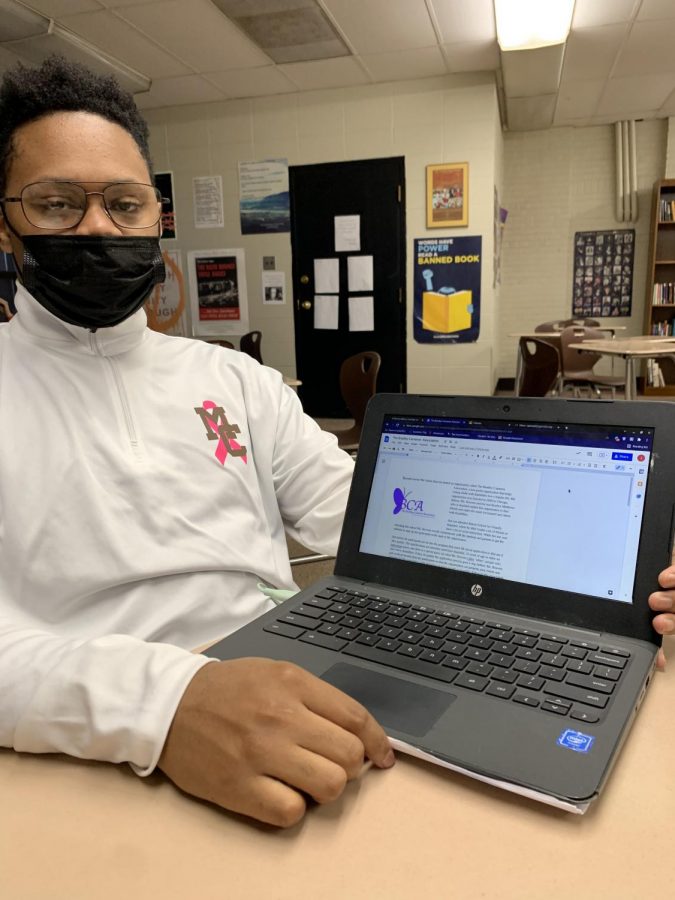Students shouldn’t have homework on weekends
MC senior Imari Price works on a assignment for 21st-Century Media class.
Teachers and students have different opinions about homework. Saying it is not fair is the usual argument, but being fair is not the issue. It is about students being prepared. Daily homework assignments can be difficult, and weekends homework assignments are worse. Students operate best when they are well-rested and ready to go. A weekend with no homework would help them to be fresh and ready on Monday morning. Weekend assignments tend to be longer and more difficult.
The students have a difficult day with classes, practices, and going to school. By Friday, (test day) they are near exhaustion. Most tests are given on Fridays. Homework on Monday-Thursday is time-consuming. Some weekends will include assignments in more than 1 class. Those who go to Mount Carmel are near the end of their rope by 2:40 PM on Friday. I have had other discussions with the senior class and we all feel pretty tired at the end of the day at 2:40 PM. A free weekend helps to get prepared for the next grind to start. No homework weekends assures better sleep cycles and a body that has recovered and refreshed. Weekends include chores around the house and family commitments. This plus weekends assignments lead to a lack of sleep. This means Monday will have a positive attitude. No homework on weekends also means more family time. This is a bonus.
Alfie Kohn in his book The Homework Myth: Why Are Kids Get Too Much Of A Bad Thing says, “There is no evidence to demonstrate that homework benefits students.” The homework on weekends starts in elementary school and continues throughout high school.
Mr. Kohn states that homework on weekends starts in elementary school and continues throughout high school. This supports the argument that weekend homework starts in elementary school and now students at Mount Carmel High School have to deal with weekend assignments. The weekend assignments take too much time and are a waste of students’ time.
Nancy Kalish, author of The Case Against Homework: How Homework Is Hurting Our Children And What We Can Do About It, says “simply busy work” makes learning “a chore rather than a positive, constructive experience.”
Receiving weekend homework that is not discussed in class and counts only as “busy work” is counterproductive. Students finish the assignments because they are required to be done. When the homework is not reviewed on Monday, it leads to frustration. Busy homework that serves no purpose is never a good idea.
Gerald LeTender of Penn State’s Education Policy Studies Department points out the “shotgun approach to homework when students receive the same photocopied assignment which is then checked as complete rather than discussed is not very effective.” Some teachers discuss the homework assignments and that validates the assignment. Some teachers however just check homework assignments for completion. LeTender goes on to say, “If there’s no feedback and no monitoring, the homework is probably not effective.” Researchers from the Curry School of Education at the University of Virginia had similar findings in their study “When Is Homework Worth The Time?” Researchers reported no substantive difference in the grades of students who had homework completion. Adam Maltese, a researcher, noted, “Our results hint that maybe homework is not being used as well as it could be. Even one teacher who assigns busy shotgun homework is enough to be a bad idea.
Students come to know when homework is the “shotgun approach.” They find this kind of assignment dull. Students have no respect for assignments like this. Quality assignments are appreciated by students.
Etta Kralovec and John Buell in their book How Homework Disrupts Families, Overburdens Children, And Limits Learning assert that homework contributes to a corporate style, competitive U.S. culture that overvalued work to the detriment of personal and familial well being. They go on to call for an end to homework, but to extend the school day.
Cooper, Robinson, and Patalc, in 2006 warned that homework could become counter productive. Homework is counterproductive when it is a (shotgun) assignment. To reiterate, not all homework is bad. Bad homework which is not reviewed in class just plain “busy work” is not positive and could be counterproductive.
Sara Croll, Literacy Coach and Author, believes too much homework causes stress for students. Diana Stelin, teacher, artist, and mother says, “I’m absolutely in favor of this ban. Homework is homework, it doesn’t matter what class it comes from. What it does is create negative associations in students of all ages, takes away their innate desire to learn, and makes the subject a dreaded chore.”
When students come to dread their homework, they do not do a great job on these assignments. Making students do a lot of homework isn’t beneficial because they get drowsy when they work at it for hours and hours at a time. It is hard for the brain to function properly when it is tired and boring.
Pat Wayman, Teacher and CEO of HowtoLearn.com says, “Many kids are working as many hours as their overscheduled parents and it is taking a toll.” “Their brains and their bodies need time to be curious, have fun, be creative and just be a kid.”
No homework on weekends is not just a wish, but it is supported by all of these educators and authors. They all champion limiting homework are totally opposed to homework assignments. Educators and students agree that no homework on weekends is a good idea. Meaningful homework, a longer school day, and discussion of homework are what these educators and authors encourage.






